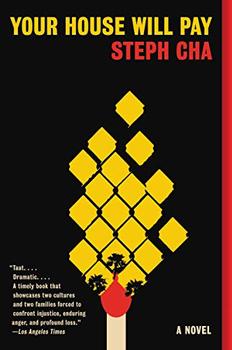Summary | Excerpt | Reviews | Beyond the book | Read-Alikes | Genres & Themes | Author Bio

Steph Cha's novel Your House Will Pay shows how a legacy of violence and injustice can ripple through generations. 27 years after the Los Angeles race riots, which were triggered by the acquittal of four police officers who had savagely beaten a Black man named Rodney King in 1991, an unarmed Black teenager is shot by police. Restlessness brews, causing the most tension Los Angeles has seen for decades.
Although plenty of people begin to protest and riot, others try to shelter themselves from the tragedy and trauma. Korean-American pharmacist Grace Park is out of touch with social issues. She has her own problems to sort out: Her sister has been estranged from their parents for two years for a reason unknown to her, and she is worried they will never make amends. African-American furniture mover Shawn Matthews is exhausted by the news due to first-hand experience. After escaping gang life and becoming a stable family man, he hopes to dodge a repeat of the violence that struck his family in the '90s when his sister Ava was murdered. But Grace and Shawn cannot hide away from the frenzied city for long. When yet another shooting occurs, disturbance pervades L.A., from Palmdale to the Valley. While the city is on the verge of collapsing into violence, the Matthews and Parks families must confront wounds from their entangled pasts.
Author Steph Cha is a Los Angeles native who grew up in the calamitous years of the racial tension and riots. Always sensing an unease between the Korean-American and African-American communities, but not quite understanding the background behind it, she dug deeper. This theme has underpinned her previous novels—Follow Her Home, Beware Beware, and Dead Soon Enough—which make up the Juniper Song trilogy. Your House Will Pay takes a more historical approach than these novels, as it is based on the murder of 15-year-old Latasha Harlins. In 1991, two weeks after Rodney King's beating, Harlins (who was Black) went to the corner store to buy juice; the Korean-American store clerk believed she was stealing and shot and killed her. Those familiar with the Harlins tragedy—which occurred mere weeks after the attack on Rodney King—will see parallels between the murder, trial and aftermath of Latasha and the fictional Ava.
Structurally, the book is sectioned into four parts. The first chapter in each part flashes back to the '90s, but the rest takes place between June and September of 2019. Imparting a sense of history and legacy, Cha creates a character-centered study of race, crime and injustice by examining her characters at two distinct periods of time. In addition to varying the timeline, chapters alternate focus between the Matthews family and the Parks family, giving both families—and their respective experiences and communities—equal weight in the narrative.
In the contemporary political landscape, with its continuing injustices linked to race, Your House Will Pay feels like narrative nonfiction, a testament to the currency and relevancy of the book. However, unlike many media takes on similar crimes, Cha examines the story from both sides of the tragedy, something that's not easy for either group to do without being either too dismissive or too angry at the other. The walls between victim and shooter dissolve as the story develops. The author effectively captures the nuances, because rather than vilifying either party, she accounts for the struggles, moral ambiguities and motivations of each character. Still, she does not deflect from the racism and classism of the past and present, refusing to deny the awful truths that people often choose to ignore to make sense of what happens to them. In this way, she crafts a story that is potent with honesty and urgency.
As Cha's journalist character Jules Searcey tells Grace Park, "There are too many videos. They bleed together. People get desensitized… The good news, if you can call it that? It's all part of the same story. Even if the news cycle has moved on, people remember." For those who wonder if reconciliation is possible, for those who seek justice, for those who try to understand others, and for those who do remember, Your House Will Pay is a necessary read. Cha's refined, braided approach to storytelling is both intelligent and heart-wrenching through the end.
For further insight into the author's inspiration and writing process, check out her interview with Dead Darlings.
![]() This review was originally published in The BookBrowse Review in October 2019, and has been updated for the
August 2020 edition.
Click here to go to this issue.
This review was originally published in The BookBrowse Review in October 2019, and has been updated for the
August 2020 edition.
Click here to go to this issue.

If you liked Your House Will Pay, try these:

by Amy Chua
Published 2024
Amy Chua's debut novel, The Golden Gate, is a sweeping, evocative, and compelling historical thriller that paints a vibrant portrait of a California buffeted by the turbulent crosswinds of a world at war and a society about to undergo massive change.

by S. A. Cosby
Published 2024
The new novel from New York Times bestselling and Los Angeles Times Book Prize-winning author S. A. Cosby, "one of the most muscular, distinctive, grab-you-by-both-ears voices in American crime fiction." —Washington Post.
Your guide toexceptional books
BookBrowse seeks out and recommends the best in contemporary fiction and nonfiction—books that not only engage and entertain but also deepen our understanding of ourselves and the world around us.